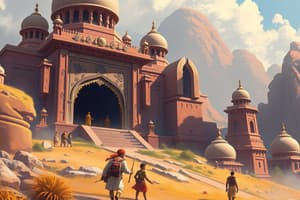Podcast
Questions and Answers
What is the standard dialect of Punjabi primarily spoken in the central Punjab region?
What is the standard dialect of Punjabi primarily spoken in the central Punjab region?
- Doabi
- Majhi (correct)
- Pothohari
- Malwai
Which script is used for Punjabi in Pakistan?
Which script is used for Punjabi in Pakistan?
- Gurmukhi
- Shahmukhi (correct)
- Roman
- Devanagari
Which of the following is true about Punjabi nouns?
Which of the following is true about Punjabi nouns?
- They are only plural.
- They are gendered and have singular and plural forms. (correct)
- They do not vary by gender or number.
- They only exist in one form.
Which of the following festivals is celebrated in Punjabi culture?
Which of the following festivals is celebrated in Punjabi culture?
Who are notable poets in Punjabi literature?
Who are notable poets in Punjabi literature?
What is a common way to say 'thank you' in Punjabi?
What is a common way to say 'thank you' in Punjabi?
Which of the following describes the variations in speech in Punjabi?
Which of the following describes the variations in speech in Punjabi?
What type of resources are available for learning Punjabi?
What type of resources are available for learning Punjabi?
Flashcards are hidden until you start studying
Study Notes
General Punjabi
- Language Family: Indo-Aryan, part of the larger Indo-European language family.
- Geographic Distribution: Predominantly spoken in the Punjab region of India and Pakistan, with significant diaspora in the UK, Canada, and the USA.
Dialects
- Majhi: Standard dialect, primarily spoken in the central Punjab region (Amritsar and Lahore).
- Doabi: Spoken between the Beas and Sutlej rivers.
- Malwai: Spoken in the Malwa region of Punjab, India.
- Pothohari: Spoken in the northern areas and parts of Pakistan.
- Majhi: Considered the basis for literary Punjabi.
Script
- Gurmukhi: Used in Indian Punjab, developed in the 16th century by Guru Angad Dev Ji.
- Shahmukhi: Used in Pakistan, adapted from the Persian script.
Grammar
- Nouns: Gendered (masculine and feminine), singular and plural forms.
- Verbs: Conjugated according to tense, aspect, and subject agreement.
- Pronouns: Personal, possessive, and demonstrative pronouns vary based on formality.
Vocabulary
- Lexical Borrowings: Incorporates words from Persian, Arabic, and English.
- Common Words:
- Hello: ਸਤ ਸ੍ਰੀ ਅਕਾਲ (Sat Sri Akal)
- Thank you: ਧੰਨਵਾਦ (Dhanvaad)
- Yes: ਹਾਂ (Haan)
- No: ਨਹੀਂ (Nahi)
Culture
- Literature: Rich tradition including poetry and folklore; notable poets include Bulleh Shah and Waris Shah.
- Music and Dance: Bhangra and Gidda are popular folk dances; music often features instruments like dhol and tumbi.
- Festivals: Celebrated with vibrant cultural expressions, including Baisakhi, Lohri, and Gurpurab.
Communication
- Informal vs. Formal Speech: Variations depending on social context and relationships.
- Proverbs and Idioms: Reflect cultural values and wisdom in everyday conversations.
Learning Resources
- Textbooks: For grammar and vocabulary building.
- Online Courses: Platforms offering Punjabi language courses.
- Language Exchange: Engaging with native speakers for practical learning experience.
General Punjabi
- Belongs to the Indo-Aryan branch of the Indo-European language family.
- Primarily spoken in the Punjab region of India and Pakistan; also prevalent in the diaspora communities in the UK, Canada, and the USA.
Dialects
- Majhi: Serves as the standard dialect, mainly found in central Punjab (Amritsar and Lahore).
- Doabi: Located between the Beas and Sutlej rivers, with its own distinct characteristics.
- Malwai: Predominantly spoken in the Malwa region of Punjab, India.
- Pothohari: Native to northern areas of Pakistan and surrounding localities.
- Majhi is the basis for literary Punjabi, influencing writing and formal communication.
Script
- Gurmukhi: Developed in the 16th century by Guru Angad Dev Ji, used primarily in Indian Punjab.
- Shahmukhi: Adapted from the Persian script, utilized in Pakistan for writing Punjabi.
Grammar
- Nouns possess gender distinctions (masculine and feminine) and exhibit singular and plural forms.
- Verbs are conjugated with attention to tense, aspect, and subject agreement.
- Pronouns, including personal, possessive, and demonstrative, vary in formality levels based on context.
Vocabulary
- Punjabi language demonstrates lexical borrowings from Persian, Arabic, and English.
- Common expressions include:
- Hello: ਸਤ ਸ੍ਰੀ ਅਕਾਲ (Sat Sri Akal)
- Thank you: ਧੰਨਵਾਦ (Dhanvaad)
- Yes: ਹਾਂ (Haan)
- No: ਨਹੀਂ (Nahi)
Culture
- Literature has a rich heritage of poetry and folklore, with significant contributions from poets like Bulleh Shah and Waris Shah.
- Music and dance forms such as Bhangra and Gidda are integral parts of Punjabi culture, often accompanied by instruments like dhol and tumbi.
- Festivals like Baisakhi, Lohri, and Gurpurab are celebrated vibrantly, showcasing a variety of cultural expressions.
Communication
- Speech varies between informal and formal contexts, influenced by social relations and setting.
- Proverbs and idioms are prevalent in daily conversations, embodying cultural values and wisdom.
Learning Resources
- Textbooks are available for those seeking to build grammar and vocabulary skills.
- Online platforms offer access to Punjabi language courses, facilitating remote learning.
- Engaging with native speakers through language exchange enhances practical understanding and conversational skills.
Studying That Suits You
Use AI to generate personalized quizzes and flashcards to suit your learning preferences.




